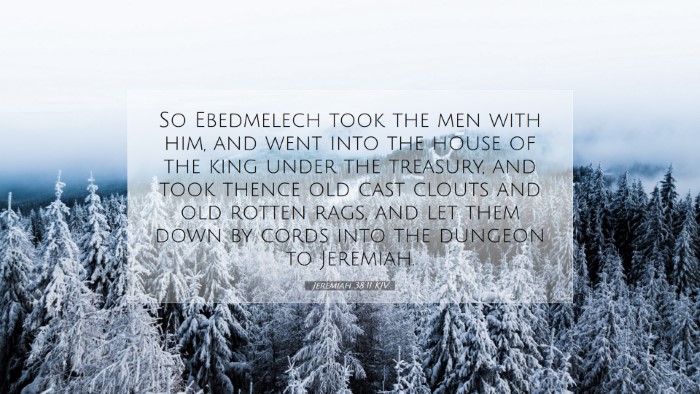Commentary on Jeremiah 38:11
Verse: “So Ebedmelech took the men with him and went to the house of the king under the treasury, and said to the king, ‘My lord the king, these men have done evil in all that they have done to Jeremiah the prophet, whom they have cast into the dungeon; and he is likely to die from hunger in the place where he is.’” (Jeremiah 38:11)
Introduction
This passage reveals the heart of Ebedmelech, a Cushite servant, who intervenes on behalf of the prophet Jeremiah. In understanding this verse, we draw insights from prominent public domain commentaries, highlighting aspects applicable to ministers, scholars, and serious students of Scripture. The context is crucial; it reflects a significant moment in the history of Judah during the Babylonian siege and showcases the compassion juxtaposed with the cruelty of leadership.
Contextual Analysis
Jeremiah had been imprisoned due to his prophecies warning of Jerusalem's impending doom. The preceding verses expose the harshness faced by Jeremiah at the hands of his own people. The role of Ebedmelech is pivotal: he emerges not just as a servant but as a voice of advocacy in a critical situation.
Insights from Matthew Henry
Matthew Henry elucidates that Ebedmelech's actions not only represent courage but also highlight the moral responsibility to defend the innocent. He notes, “Ebedmelech's courage was remarkable; he speaks boldly to the king about the wrongs done to Jeremiah.” This highlights the intersection of personal conviction and social justice, reminding readers that situations demand action when others are oppressed.
Albert Barnes’ Perspective
Albert Barnes reflects on the significance of Ebedmelech's descent to the king, emphasizing that he approached the king “under the treasury.” Barnes suggests this symbolizes the fiscal and spiritual decay within Judah’s leadership. The king’s attention is drawn not only to Jeremiah's plight but also to the entombing weight of moral failure permeating the society.
Adam Clarke’s Commentary
Adam Clarke takes note of the physicality of Ebedmelech's mission, conveying that he “took the men with him.” This illustrates a community effort in advocating for justice, enriching the notion that compassion does not thrive in isolation. Clarke notes, “His appeal is based on reason; he points out the evils of their actions.” This demonstrates a strategic approach to advocacy, appealing not just to emotion but also to rational accountability.
Theological Implications
The theological implications herein are profound. Ebedmelech serves as an archetype of Christ-like intercession, standing between the oppressor and the oppressed, embodying the essence of advocacy in dire circumstances. Pastors may draw from this passage to encourage their congregations to be advocates for justice in their communities.
Lessons on Intercession
Considering the act of intercession, Ebedmelech’s example calls for reflection upon the biblical duty to stand for those who cannot advocate for themselves. This serves as a powerful reminder for leaders and laypersons alike, to cultivate a spirit willing to challenge injustice.
Application for Church Leaders
- Championing the Cause of the Oppressed: Leaders are called to be champions of social justice and compassion, reflecting Christ's love.
- Emphasizing Courage: It takes courage to speak out against injustices. Ebedmelech’s boldness can inspire others to rise in courageous advocacy.
- Fostering Community Efforts: Promoting collective efforts in advocacy aligns with the New Testament’s call to bear one another’s burdens.
Conclusion
Jeremiah 38:11 serves as a pivotal point in understanding how righteousness can challenge authority when it becomes corrupt. The character of Ebedmelech emerges as an exemplary model within the larger narrative of Jeremiah's prophecies. As scholars study this text, the insights gleaned from commentaries allow for a rich understanding of courage, advocacy, and the need for justice in both ancient and contemporary contexts.
May the reflections drawn from this verse deepen the commitment to advocate for truth and justice, echoing the sentiments of Ebedmelech in every corner of our communities.


